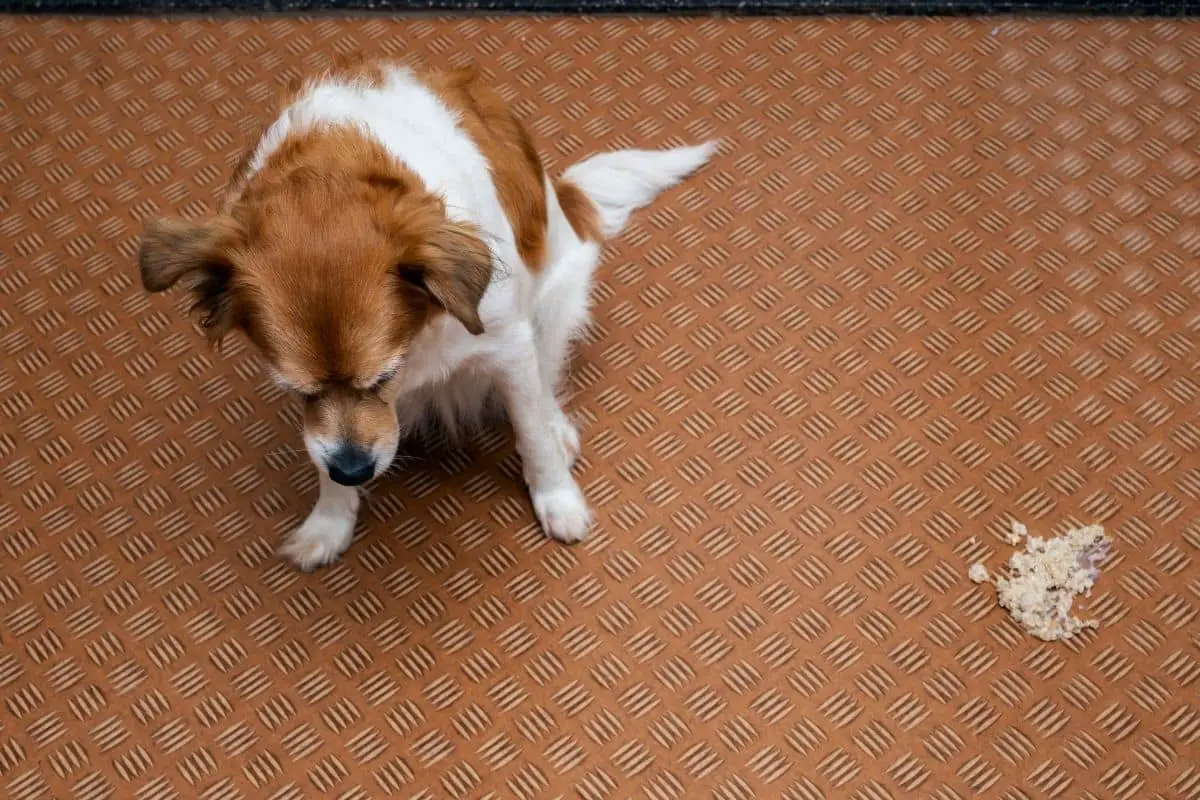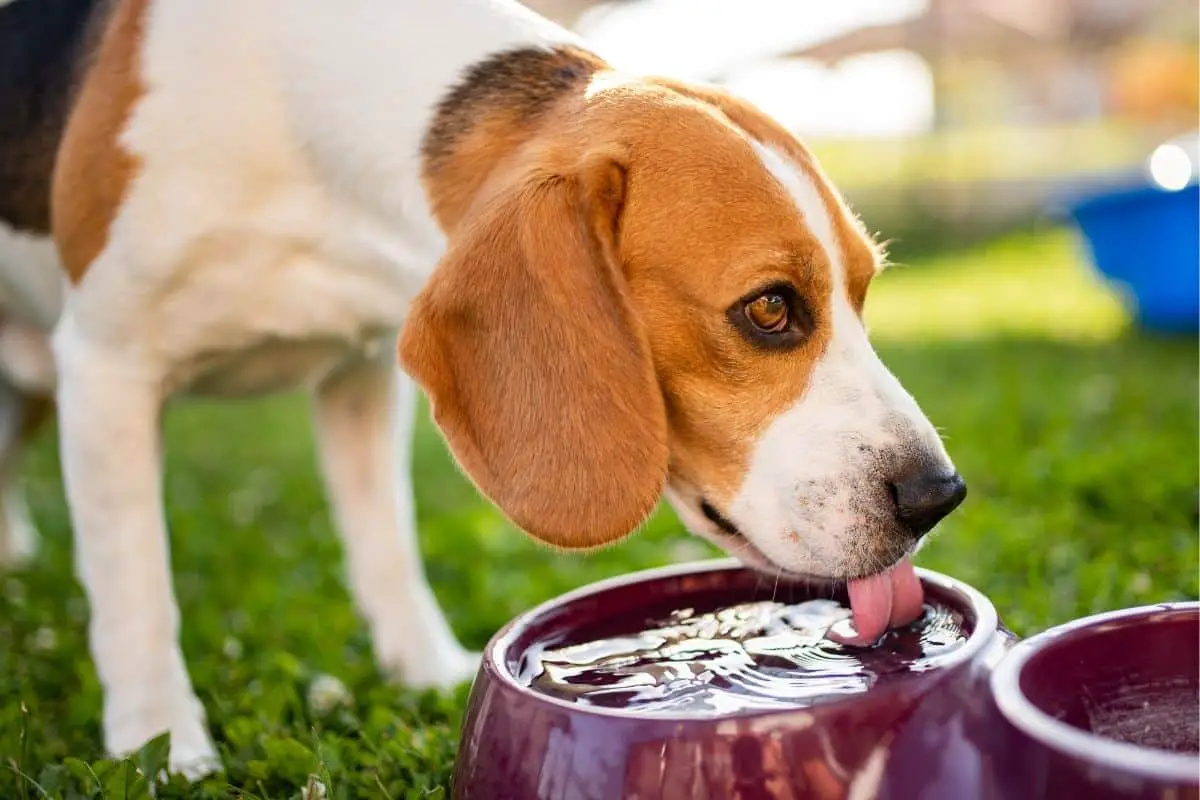Canine constipation is a common problem that can lead to serious health issues if not treated promptly.
This condition is caused by the accumulation of hard stool in your dog’s gastrointestinal tract, which can cause discomfort and pain for your pet.
In this article, we are going to look at how you can help your pet if they are suffering from constipation.
So, let’s get started!

What Is Constipation?
Constipation is a condition in which an animal, or human, has difficulty passing feces or stool. This condition can be uncomfortable for your furry friend and can even lead to complications.
Some symptoms of constipation in dogs are as follows:
- Lethargy
- Vomiting
- Diarrhea
- Abdominal pain
- Weight loss
- Straining while trying to pass feces
- Inability to defecate
If you notice any of these signs, it may be a sign that your dog is suffering from constipation, and you will need to try to help them.
What Can Cause Constipation in Dogs?
Constipation can be caused by several things. Some common causes include:
- Stress
- Poor diet
- Dietary changes
- Urinary tract infection (UTI)
- Age
- Certain medications
- Surgical procedures
- Certain medical conditions
- Improper Dieting
There are many diets that can cause constipation. The best diet for your pet depends on their age and breed. Here are some tips on how to keep your dog’s stools soft and easy to pass.
- Eat high-fiber foods such as raw vegetables, fruits, whole grains, and legumes. These are great sources of fiber. They also have lots of water, so they make your dog feel full longer than other types of food.
- Keep feeding small meals throughout the day instead of large ones. If you feed your dog too much all at once, it can actually strain their stomach lining.
- Be sure to use a well-balanced diet. A balanced diet includes proteins, carbohydrates, vitamins, minerals, fats, and antioxidants. Make sure your dog gets enough protein and fat to maintain healthy skin and hair.
- Don’t overfeed your dog! Many owners are guilty of giving their pets more food than they should. They think that this is what makes their dog happy. However, it is actually just making your dog obese and overweight. Overfeeding your dog will cause him to have digestive problems like diarrhea and constipation.
- Exercise your dog! Regular exercise keeps his muscles strong and helps prevent obesity. It also gives him energy.
- Provide adequate hydration. Water is essential to maintaining a healthy body. In fact, if your dog doesn’t drink enough water, he could get dehydrated and suffer from fatigue and dizziness.
What Can You Do to Help?
But if your dog already has constipation, what can you do to help? In this section, we are going to explore exactly that. So, let’s get started!
Exercise Your Dog a Little More Frequently
A good way to help with your dog’s constipation is by exercising him more frequently. This means taking him out for a walk every morning before breakfast. This provides him with extra time to poop and helps to encourage your dog to evacuate their bowels.
Exercising your dog regularly not only helps with digestion, but it also improves his overall health. Plus, it relieves stress which helps reduce anxiety and depression in dogs.
Make Sure That There is Plenty of Fresh Water Available
Fresh water is important for your dog’s digestion because it prevents dehydration. Dehydration is one of the leading reasons why dogs develop constipation.

If your dog drinks plenty of fresh water, he won’t become dehydrated and will have better control over his bowel movements.
Give Your Dog Fiber Supplements
Fiber supplements are very helpful for dogs who experience constipation. These products contain natural fibers such as flaxseed or psyllium husk. Some even include probiotics to improve your dog’s intestinal flora.
Flaxseed can be found at most grocery stores and online. It can be added to any dry food recipe or mixed into wet food.
Give Your Dog Softer Food
If your dog eats hard pellets, try switching them to softer kibble or canned wet food. Soft food doesn’t require chewing and may take less time to digest.
When choosing canned wet food, look for those made from chicken or fish rather than beef. Chicken and fish tend to be easier on a dog’s system and will provide more nutrients as well.
Give Your Dog a Laxative
Some dogs need laxatives to keep their bowels moving. Although these products aren’t necessarily recommended for all dogs, they might work wonders for some. The best thing to do is consult your veterinarian for advice on how to administer your dog’s medication.
Give Your Dog a High Fiber Food Like Pumpkin Purée
Pumpkin purée contains high fiber and soluble carbohydrates. Dogs love pumpkin purée, and it can easily be incorporated into dog treats. Simply add one cup of cooked pumpkin purée per 25 pounds of dry dog food to make a treat mixture.
Use a Natural Remedy Instead of Medicine
There are many things that can be done naturally to help prevent constipation in dogs. One of the simplest ways to help is to feed your dog foods rich in fiber. These include whole grains, fruits, vegetables, beans, lentils, oats, and brown rice.
By eating a diet like this, your dog will feel full longer and will therefore eat fewer calories. This means your dog will consume fewer calories overall and therefore weigh less.
In addition, when you give your dog a high-fiber diet, they’ll pass stools more often since there isn’t anything bulky to move through their digestive tract.
Give Your Dog an Enema
An enema is another home remedy that can help relieve constipation. An enema works by injecting fluid into the rectum via syringe. Once inside, the fluid acts as a lubricant and makes it easy to push stool out of the colon.
To perform an enema, place the tip of the syringe just behind where the tail attaches to the body. Push the plunger down until the liquid comes out. Repeat this process several times daily until the problem is resolved.
When Should You Take Your Canine Companion to the Vet?
Constipation usually clears up on its own, with the help of your care and encouragement your dog should be back to their usual happy self.
But, if your canine companion does not pass feces for 24 hours or more you may need to bring them to the vet where they can be properly examined.
If you notice blood in the stool, abdominal discomfort, excessive gas, diarrhea, vomiting, weight loss, lack of appetite, or decreased activity, then contact your veterinarian immediately. They can diagnose and prescribe treatment for your dog’s condition.
Frequently Asked Questions
Finally, in this section, we have answered some of your most burning questions concerning constipation in dogs. So, without further ado, let us get started.
How Can You Stimulate Your Dog to Poop?
There are a few things you can do to help stimulate your dog to poop. The first thing you can do is make sure that they have enough water.
Secondly, you should take your dog out for long walks and maybe even play games with them. Being active helps to get their bodies working and may encourage them to defecate.
If you feed your dog dry food, try switching it up with some wet food.
What Should You Do if Your Dog Hasn’t Pooped in Four Days?
If your dog hasn’t pooped in four days you might want to think about taking him/her to the vet. It could be something serious such as a urinary tract infection or it could simply be constipation. Whatever the case may be, your dog needs medical attention.
Can You Give Your Dog Olive Oil for Constipation?
Olive oil has been used for centuries as a natural remedy for various ailments including constipation.
However, olive oil is not recommended for use as a laxative because it can cause side effects such as inflammation of the stomach lining.
How Can You Tell if a Dog Has an Intestinal Blockage?
A dog who has an intestinal blockage cannot digest food and will begin to suffer from severe pain.
A dog suffering from an intestinal blockage may also experience bloody diarrhea. If you suspect that your dog may have an intestinal blockage, contact your veterinarian right away.
What Laxatives are Safe for Dogs?
Laxatives are safe for dogs, but there are certain types of laxatives that are not suitable for use in dogs. These include mineral oil, castor oil, milk-based products, and any type of product containing alcohol.
There are also prescription drugs that work well for treating symptoms of constipation. Ask your veterinarian which medications would be appropriate for your pet.
Final Thoughts
It’s important to know when to seek veterinary assistance for your dog. If you see signs of illness such as lethargy, diarrhea, bleeding, or dehydration, immediately call your vet.
Even though you may feel confident that your dog is fine otherwise, sometimes a minor injury can lead to much bigger problems down the road.
Remember that while you love your furry friend dearly, he or she loves you just as much! Take good care of your best friend by keeping him healthy and happy.
- What Dog Breeds Have Pink Skin? - March 24, 2023
- What Are the Most Inspiring Dog Breeding Quotes? - March 20, 2023
- Can Pheromone Spray Help Improve Dog Breeding Results? - March 19, 2023








